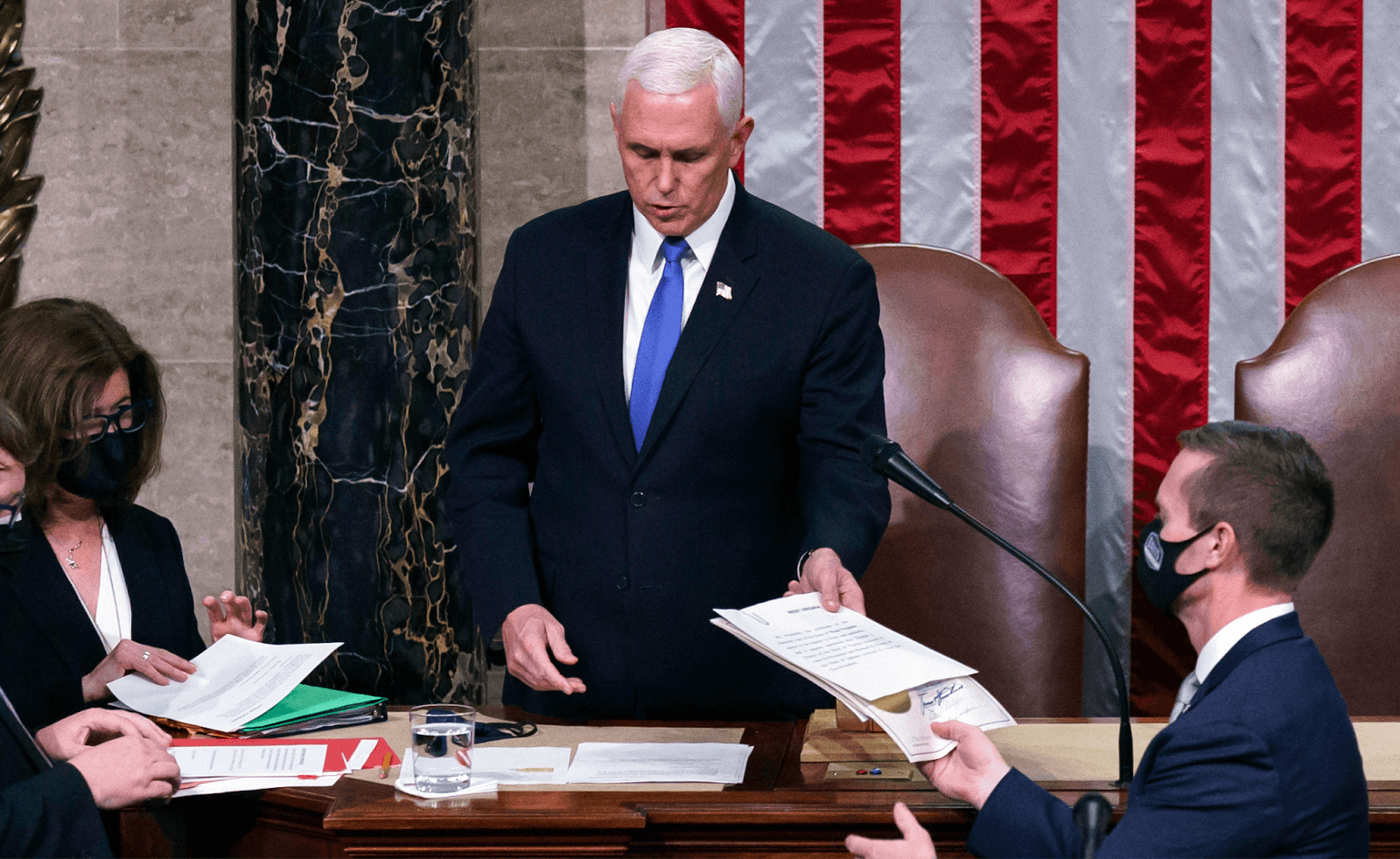Classroom Content

The Upcoming Lame-Duck Congress Is Going to Be Epic
- Article •
- 10/15/2022

Democrats fire up push for DACA amnesty in lame duck session before GOP takes House
- Article •
- 10/19/2022
Congressional Democrats have a long to-do list for the lame-duck session.
 This is such a lame duck, am I right?
This is such a lame duck, am I right?Six Weeks Out. When Congress meets after an election, but before the end of its term, it is known as a lame-duck session. In some instances, congressional leadership will push to pass legislation during a lame-duck session if it feels it cannot in the new Congress — often due to a change in who controls one or both chambers. With Republicans taking back the House in the midterm elections, Democrats are rushing to tackle several legislative priorities before the clock runs out — when the new Congress takes office on January 3, 2023. Over the next month and a half, Democratic leaders hope to have a productive lame-duck session, hitting topics like the federal budget, election laws, and social policies.

House Speaker Nancy Pelosi talks with Senate Majority Leader Chuck Schumer during the Moms Demand Action Gun Violence Rally on June 8, 2022, in Washington, DC. Nathan Howard| Getty Images | Vox
Recent Parallels. Following the “red wave” in 2010, when Republicans took over the House, Democrats passed several significant bills in the lame-duck session, including the repeal of “Don’t Ask, Don’t Tell” — a policy about LGBTQ soldiers in the military. After Democrats won back the House following the 2018 elections, Republicans similarly approved key legislation, passing the First Step Act and reauthorizing the farm bill. With the looming threat of a change in congressional power, these sessions are often the most productive meetings of Congress — over the past decade, more than a quarter of passed legislation has occurred during the lame-duck sessions.
Funding Bill. In September, President Biden signed a stopgap funding measure through December 16. With that deadline rapidly approaching, Congress must pass another bill to avert a government shutdown. Previously, lawmakers of both parties have used the looming threat of a shutdown to try to extract policy concessions from the opposition. After House Republican Leader Kevin McCarthy (R-CA) suggested a Republican-controlled House would look upon funding for Ukraine with more scrutiny, Democrats may leverage the funding bill to attempt to secure more assistance in the lame-duck session. Lawmakers can either pass an omnibus spending agreement for the next fiscal year or another short-term measure — a continuing resolution — and revisit the issue later.

Debt Ceiling? Perhaps the most notable potential change regarding government spending is with the debt ceiling — a limit Congress sets on how much money the U.S. government can borrow to pay its financial obligations. While failing to fund the government results in a shutdown, failing to lift the debt ceiling would result in a default. Allowing the United States to default would be catastrophic, so lawmakers generally raise the debt limit without too much issue. However, some Democrats worry Republicans will try to leverage the cap to force spending cuts, and the move is not without precedent. So, concerned Democrats suggest Congress should preemptively lift the debt ceiling — or remove it altogether. However, such a move does not have a clear majority of support and is competing with other budget priorities that must pass, making it unknown if the leadership will call a vote on the measure.
Counting the Votes. Following presidential elections, Congress meets in January to certify the Electoral College vote count. After the 2020 elections, former President Donald Trump and some members of his team advanced a legal theory that suggested the Vice President — who presides over the joint session of Congress — could unilaterally reject electors from swing states, alleging widespread voter fraud. Many Republican lawmakers also objected to certain states’ certification, similarly trying to remove their votes from the count. Under these scenarios, where no presidential candidate would receive the required 270 electoral votes, the House of Representatives would decide the election — an outcome likely to favor the former President in the Republican-controlled chamber.

A Proposed Change. While Pence ultimately refused pressure to toss swing-state electors and several lawmakers’ objections failed, the incident sparked concerns among some about the obscure law governing the process — the Electoral Count Act. In response, some members of Congress have proposed reforms to the legislation, clarifying the vice president’s role in the process as purely ceremonial and raising the threshold for objections to the count. While the House passed a bill to that effect earlier this year, the Senate hopes to approve its bipartisan version — backed by both the Majority and Minority Leaders — during the lame-duck session.
Respect for Marriage Act. In the aftermath of the Dobbs decision, a concurring opinion from Justice Clarence Thomas sparked concerns among Democrats that the Supreme Court may reconsider some of its prior rulings on same-sex or interracial marriage. Those fears spurred Democratic lawmakers to seek a bill enshrining protections for those unions in federal law. Dubbed the “Respect for Marriage Act,” a bipartisan group of lawmakers worked together to craft a bill which could pass. In July, the House approved it with a bipartisan 267-157 vote. However, in mid-September, Majority Leader Chuck Schumer (D-NY) delayed a vote on the bill until after the midterms when negotiators asked him for more time to secure support — due to the filibuster, the legislation needs at least 10 Republican senators to back it.

Last week, the bill overcame a procedural hurdle in the Senate with 62 votes — a sign the legislation might have the support it needs to avoid a filibuster. If the Act passes in the Senate, the amended version will go back to the House and, if approved, head to the President.
Others. While already adding up to an extensive laundry list, lawmakers are pushing for a host of other votes in the lame-duck session. Congress will likely take up the must-pass National Defense Authorization Act soon — an annual defense policy bill. While the measure will almost certainly receive bipartisan support, some members could try to add amendments to the legislation, such as provisions punishing OPEC for cuts in oil production. Some Democrats are also pushing for Congress to take up legislation regarding Dreamers — undocumented immigrants who came to the U.S. as children — in the lame-duck session. Also, Senate Democrats are eager to continue the confirmation of Biden administration appointees and will likely approve several judges and agency heads in the next few weeks.
Still, with the 60-vote filibuster threshold in the Senate, other key Democratic priorities — such as passing legislation codifying Roe v. Wade — have no real path forward in the lame-duck session. Regardless, the administration only has six weeks left of guaranteed Democratic control in Washington. What priorities Democrats choose to spend that limited time on ultimately remains to be seen.
Democratic lawmakers must urgently get to work on our to-do list for the next six weeks. Congress has many must-pass bills to deliver in a short timeframe. If we do not act before the GOP takes over the House in January, extremist Republicans could hold the U.S. economy hostage and block crucial electoral reforms and social policies. Democrats must approve bills funding the government, lifting the debt ceiling, preventing another January 6, and protecting marriage equality — among other measures.
Prior to the Democrats losing control of the House of Representatives, they are attempting to pass a series of radical reforms that otherwise would have failed during the regular session. Once Republicans assume control, they will focus on uncovering the corruption of the Biden administration — including investigations into the DOJ’s targeting of parents protesting school boards and Hunter Biden’s illicit dealings in Ukraine.
Connect this story to the curriculum you're already using. Are you using this differently in your class? Send us an email at team@civilmedia.io, and we'll add a connection here.

